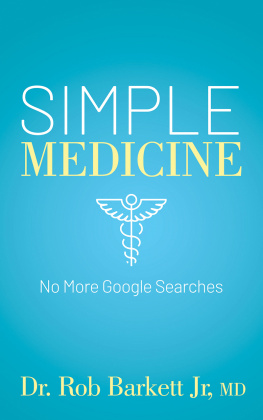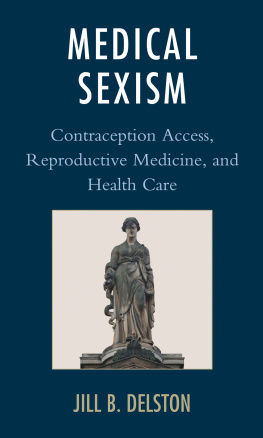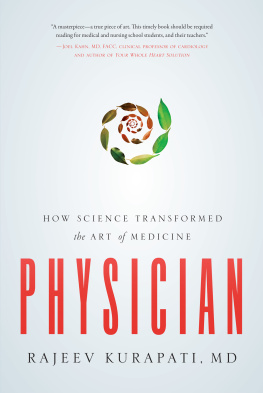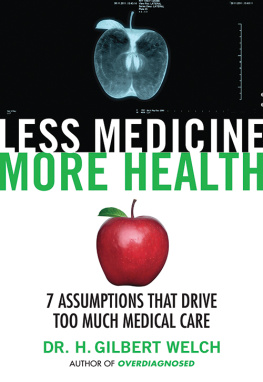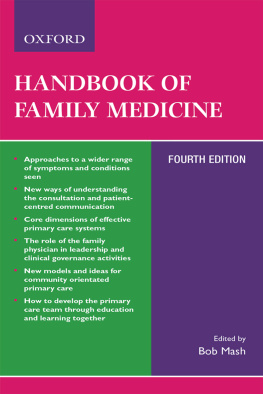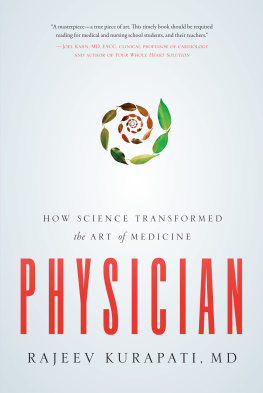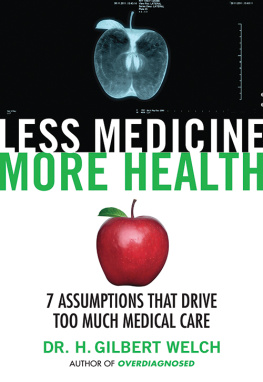Simple Medicine
SIMPLE
MEDICINE

No More Google Searches
Dr. Rob Barkett Jr, MD

NEW YORK
LONDONNASHVILLEMELBOURNEVANCOUVER
SIMPLE MEDICINE
No More Google Searches
2022 Dr. Rob Barkett Jr, MD
All rights reserved. No portion of this book may be reproduced, stored in a retrieval system, or transmitted in any form or by any meanselectronic, mechanical, photocopy, recording, scanning, or otherexcept for brief quotations in critical reviews or articles, without the prior written permission of the publisher.
Published in New York, New York, by Morgan James Publishing. Morgan James is a trademark of Morgan James, LLC. www.MorganJamesPublishing.com
Proudly distributed by Ingram Publisher Services.

| ISBN 9781631956492 paperback ISBN 9781631956508 ebook Library of Congress Control Number: 2021938727 Cover and Interior Design by: Chris Treccani www.3dogcreative.net |

Morgan James is a proud partner of Habitat for Humanity Peninsula and Greater Williamsburg. Partners in building since 2006.
Get involved today! Visit MorganJamesPublishing.com/giving-back
Introduction
Growing up as a doctors son in a smaller community, I was quite starry-eyed about medicine. The doctors I observed were curing the masses, loved, respected, placed upon a pedestal, wealthy, and intelligent. During medical training and after passing medical board examinations, I could diagnose and treat problems from A to Z. The problem lies in that primary care providers may see the majority of conditions once or twice in a lifetime. I have provided the most common conditions that physicians will treat daily, and they must be familiar with the atypical presentations of the common conditions. For older physicians that are stuck in their old ways, the hope is that they will see that life-changing medications and treatments are at their disposal.
Today, I am a grizzled veteran of twenty-seven years in primary care medicine. I have two target audiences: the general public who are invested in their health and primary care physicians. In the pages that follow, I will bridge old- and new-school medicine, preserving the past traditions while embracing new technologies. I will address the changing doctor-patient and doctor-doctor relationships that are quite different in this day and age.
I began practicing medicine in an autonomous situation where I could prescribe any medicine or order any study I desired. Medicine is no longer autonomous as insurance companies dictate what the physicians may do. Patients are information hungry and desire instant gratification. Patients no longer discuss their symptoms with me; they just tell me their diagnosis. Google searches have taken over their medical care. When I Google certain diseases, differential diagnoses, and medications, it is often difficult for even me to understand the explanations; it is very time-consuming, and nothing is concise. I have written this book in laymans terms and hope the general public will understand it clearly.
During patients office visits, doctors speak in medical terms and discuss diagnostic testing and disease states as if patients actually understand what they are telling them. What Ive done here is provide patients a Cliffs Notes version of common diseases, laboratory reviews, simplified testing, and medications that should be prescribed for common problems. Patients deserve to know what doctors are thinking and why we are prescribing certain medications and not prescribing others that are potentially harmful for them. Multiple yet equally effective screenings, tests, and treatment plans exist for every disease, including cancer. My recommendations reflect the standard of care and are cross-referenced with the American College of Physicians publication, Medical Knowledge Self-Assessment, Number 17.
I have grown bitter with the change in medicine, which has ruined the physician-to-physician relationships. Communication between physicians is awful as information is passed on by fax or redundant chart notes from the electronic medical record (EMR). Phone calls are almost extinct between the specialist and primary care physician. Also, EMR has changed the whole dynamic of routine office visits with patients. No longer can doctors practice medicine like the empathetic and caring Marcus Welby, MD! Since I was trained in old-school medicine and have adapted to the new technology, hospital-owned practices, hospitalists, and EMR, I believe my advice will be beneficial to the general public, medical students, residents, and young doctors. I hope it will rattle the chain of large hospital institutions.
Sincerely,
Robert E. Barkett Jr., MD

SECTION I
The Changing Medical World
I had absolutely no desire to write a book in my lifetime. I have practiced internal medicine for the past twenty-seven years in Mansfield, Ohio and have a strong math and science background. Writing this book is a way to help my patients to the best of my ability. Over the past several years, I have noticed all the changes in the day-to-day practicing of medicine, but none of the changes have been beneficial to the doctors or to patient outcomes. I found myself constantly complaining to my wife, patients, colleagues, or anyone else who would listen to what I was saying. I felt powerless since I believe that whatever I said would probably not change anything whatsoever.
One afternoon while driving to Columbus, my wife, Melissa, was listening to another podcast by Oprah Winfrey, whom she so loves and admires. I had a revelation while Oprah was interviewing Lady Gaga, and Lady Gaga was discussing all of her wounds, trauma, and setbacks in a very raw, honest interview. Lady Gaga said if she could open up and discuss her problem, such as her abuse as a child, and her experience could help just one person, it would all be worthwhile. A lightning bolt struck my brain, and I told Melissa right then and there that I was going to write a book. She laughed, of course, since I have zero writing skills, and this was a complete shock to her.
I am very concerned over the quality of care for patients nationwide. The insurance companies, including Medicare and Medicaid, are dictating what medicines the patient may or may not have and what treatments, testing, and studies they will allow or cover. The physician-to-physician relationships and communication are starting to fail. But what is most alarming is that many patients are not receiving the standard of care for their medical conditions. This book is not intended to be a textbook but more of a reference guide to both patients and primary care providers.
My reference point comes from the new patients I see in the office from referrals from other physicians or even my current patients. Also, I am constantly reviewing medical charts as I am the medical director for both a nursing home and hospice agency. I am astonished by either their lack of care or gross neglect of the usual standard of care for treatment. I understand you can take a horse to water, but you cannot make it drink. But many patients have never been advised to have Pap smears, colonoscopies, mammograms, vaccines, spirometry, or the standard lab work. Many patients are taking way too many medications, or what we call polypharmacy, which increases the risk of drug-to-drug interactions, and some medications are contraindicated for that particular patient. I have told my colleagues many times that what I do is not brain surgery. Doctors must just take their time, keep up-to-date with the current guidelines, and have compassion for their patients. I try to treat each patient as if he or she were part of my family.
Next page
